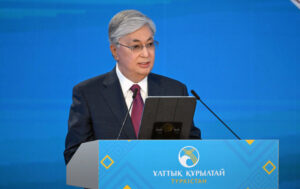Green Goals or Greenwash? Environmental Rhetoric in Mining Deals

Amid the headlines celebrating new mining partnerships between Pakistan and the United States, a recurring narrative has emerged: that these deals are “green,” sustainable, and environmentally sound. Promises of eco-friendly mining technologies, reduced carbon footprints, and community development programs are now standard talking points in official statements. But scratch the surface, and a critical question emerges: are these green claims rooted in reality, or are they mere greenwash?
Greenwashing refers to the practice of making exaggerated or deceptive environmental claims to mask harmful activities. In the mining sector, it often involves showcasing minor sustainability initiatives while ignoring larger ecological damage. As new mining projects ramp up in Pakistan’s mineral-rich regions, the risk of greenwashing looms large.
To begin with, mining by its very nature is an extractive and environmentally intrusive industry. It disrupts ecosystems, depletes groundwater, generates toxic waste, and contributes to air and soil pollution. While there have been advances in cleaner mining techniques, the implementation of such methods is costly and often inconsistent—especially in countries with weak regulatory enforcement.
Statements from officials and corporations alike have emphasized “green mining” as a cornerstone of the new U.S.-Pakistan mining collaboration. But few details have been offered about what this actually entails. Are renewable energy sources being used to power mining operations? Are there concrete plans for land rehabilitation post-extraction? How will hazardous waste be managed? In the absence of transparent data, such claims ring hollow.
A particularly glaring omission is the lack of comprehensive Environmental Impact Assessments (EIAs). In some reported cases, mining exploration has begun even before formal environmental approvals were granted. This not only violates domestic laws but also international environmental norms. Without robust EIAs and baseline ecological studies, it is impossible to assess the true impact of mining activities.
Moreover, the regions being targeted—such as Balochistan and Gilgit-Baltistan—are home to fragile ecosystems and vulnerable communities. These areas are already grappling with the effects of climate change, including water scarcity and glacial melt. Unchecked mining could exacerbate these crises, leading to long-term environmental degradation and social instability.
One proposed solution is to establish independent environmental monitoring units for each mining project. These bodies should include scientists, civil society members, and local community representatives. Their mandate would be to regularly assess environmental indicators and publish public reports. Transparency must be non-negotiable.
Another issue is the disposal of mining waste—commonly known as tailings. Improperly managed tailings can leach toxic substances into soil and waterways, endangering both human and ecological health. Best practices exist for tailings management, but enforcement remains a challenge. Pakistan must ensure that all mining firms—foreign or domestic—adhere to international environmental standards.
The push toward “green” narratives also risks overshadowing the voices of indigenous and rural communities. In many cases, these populations are the first to bear the brunt of ecological harm but the last to be consulted. Real sustainability requires their full and informed participation—not just token consultations.
Furthermore, there is a pressing need to integrate climate resilience into mining governance. This includes requiring climate risk assessments for all mining projects, as well as mandating carbon offset initiatives and reforestation programs. Mining revenues should also be channeled into renewable energy development and climate adaptation infrastructure.
If done right, mining could support a green transition by providing critical minerals for renewable technologies. But this is only possible if the extraction process itself is environmentally just. Otherwise, the green economy risks being built on the backs of sacrificed ecosystems.
Pakistan stands at a crossroads. The current mining boom could either deepen environmental injustice or pave the way for a more sustainable model of development. To choose the latter, policymakers must move beyond rhetoric and commit to real, enforceable environmental governance.
The stakes are high. Green promises mean little without green action. It’s time to hold mining agreements accountable to the standards they claim to uphold—and ensure that “green” doesn’t become just another shade of exploitation.

